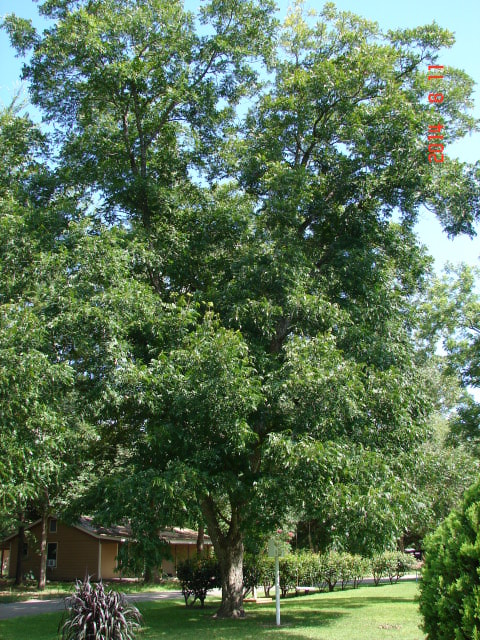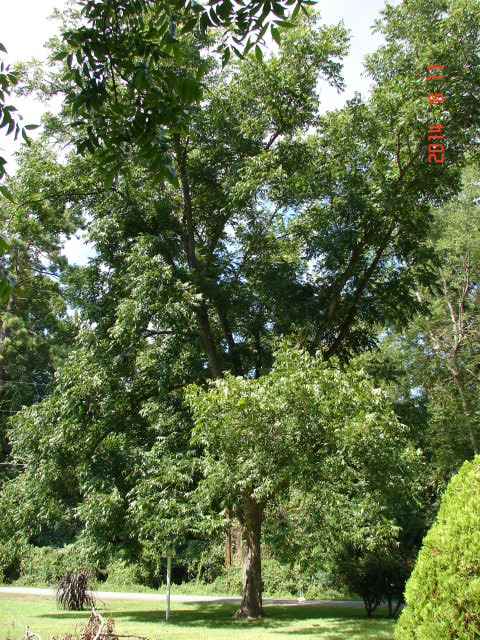QuestionQUESTION: We're new homeowners (1 1/2 yrs) and the property has two pecan trees. The largest tree produces the paper shell pecans that are long. We the problem is they turn black and fall off the tree by the hundreds, but the tree does produce only a few good pecans a year. This is the 2nd growing season since we've been here. We've fertilized the ground with a fertilizer that had zinc in it also this year we put 3" plastic pipe 2' in the ground, with a removable cap, in 4 places around the tree (1/2 way out the drip line) and fertilized with a 16-16-16 and plan to fertilize 3 time in the year in hopes to make it produce better or regain its health. Can you help us get a healthy tree? What can we do to keep from getting black pecans? Please give us simple instructions because we are total "new" at this but trying our best to give these trees a good chance. The second tree produces very nice pecans that are full and taste delicious. It is located a different side of the house. They do not turn black thankfully. I hope you will be able to respond to our email listed above.
Thank you for your helpful instruction.
Linda and Delbert
ANSWER: Hi Linda & Delbert, I am an organic grower this is a new disease called Phytophthora cactorum
occuring on pecans. Now when I read this the first thing I would consider is am I watering too much or is it raining too much as it is basically root rot. When I had this in a citrus tree of mine I turned off the water to it and watered when needed and it lived for another 10 years of so. So maybe you could figure out what is happening differently to both trees. I use a product called Atomic Grow that is organic and it makes the plants healthy by raising the brix or sugar in the plant. I would treat both as if this disease is going around it is a matter of time before the other one gets it. Fertilizer that it put on the ground are chemicals that could also harm you trees and plants. We use a product called Key Plex that you spray on along with the Atomic Grow. Atomic Grow will also correct the fungal problem. kathy
---------- FOLLOW-UP ----------
 pecan tree
pecan tree  pecan tree
pecan tree
QUESTION: Ms. Kathy, thank you for your response answer. The help with further information may I say that the tree is big. It is 69" around and very tall. The only watering it gets is whatever falls from the sky, so over watering should not be the problem. We live in Southeast Texas about 2 hours from the coast and our soil is sandy. We are even low on our rain levels this year. A limb fell from the tree 5 days ago. The limb was green and did not seem to have anything wrong with it.
When I went out to measure the tree it had something like spider webs on the trunk of the tree. Should we try to get some tree guy out here to see what's wrong with the tree or get help with what can be sprayed on it? I know you are an organic grower but could something they offer help? The tree really grows up very tall and wide. We don't know the age of the tree but think it could be 25 or more years old. Our neighbor has 3 pecan trees, the root system of 2 of the trees intermingle with the second tree we have on our property. We both live on 1/2 acre lots. One tree is healthy (neighbors trees are healthy) one tree (the paper shell tree) seems to be getting sick. I do know the year we moved in the neighbors said that the tree had a bumper crop of pecans...it has not produced that way in the past two years. Do you have any questions for me that would help you help me?
AnswerHi Linda, The lack of rain could be a problem in the low fruit production. If the web you speak of comes back when you try to get rid of it? Relax and sit back, there is no need for concern or control. What you are seeing is the
webbing of a small insect that feeds on lichens, fungi, pollen and decaying organic
matter. This small, harmless insect is called a psocid or webbing barklouse. Its scientific
name is Archipsocus nomas.
Psocids construct a fine silken web on tree trunks and sometimes on large branches. This
web protects the maturing insects from rain and predators. The webs may look unsightly,
but neither the insect nor its web cause any harm. These webs are usually observed
during the summer months. kathy







